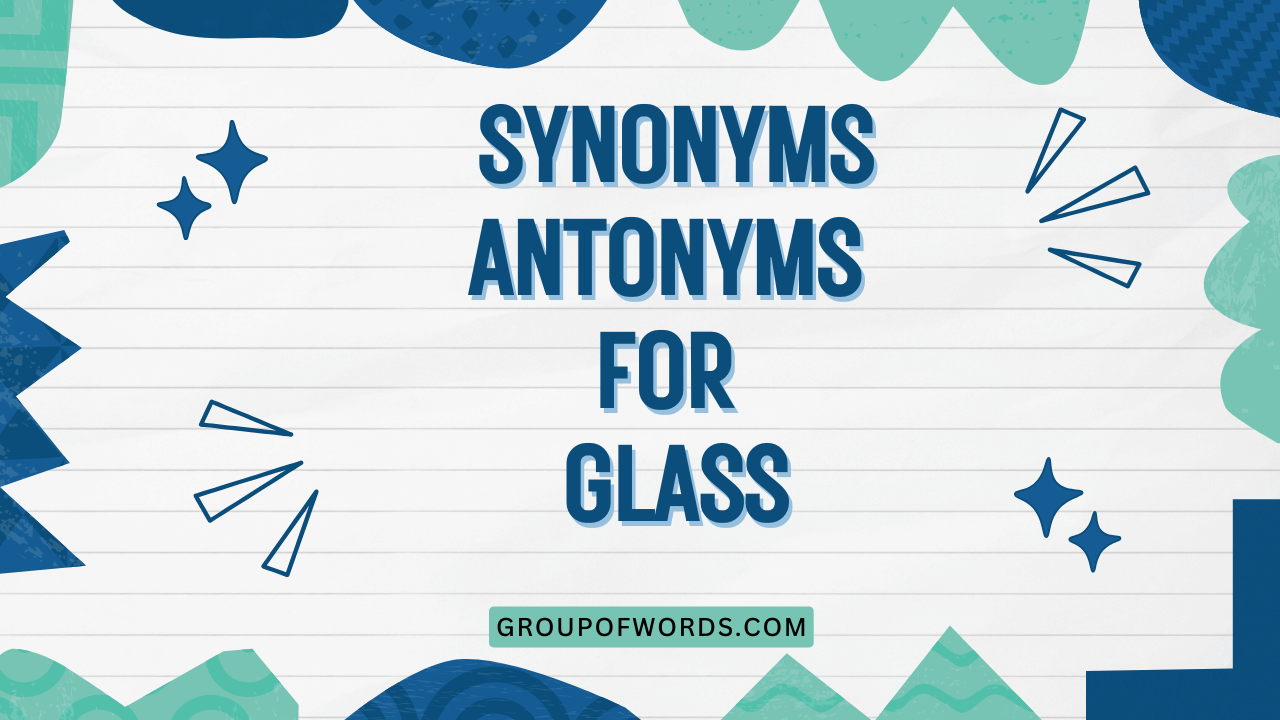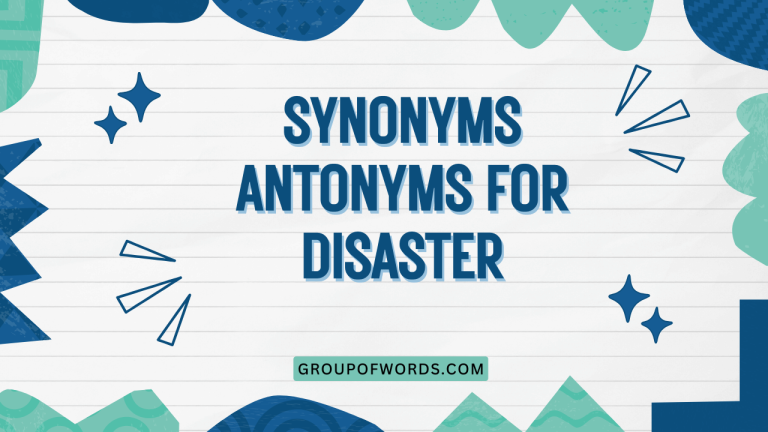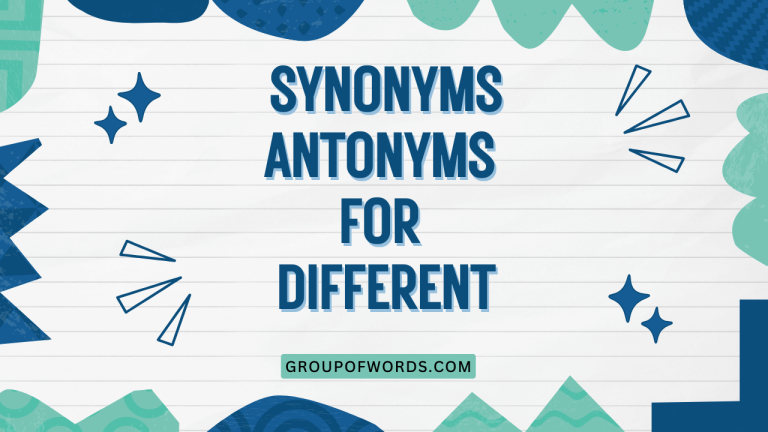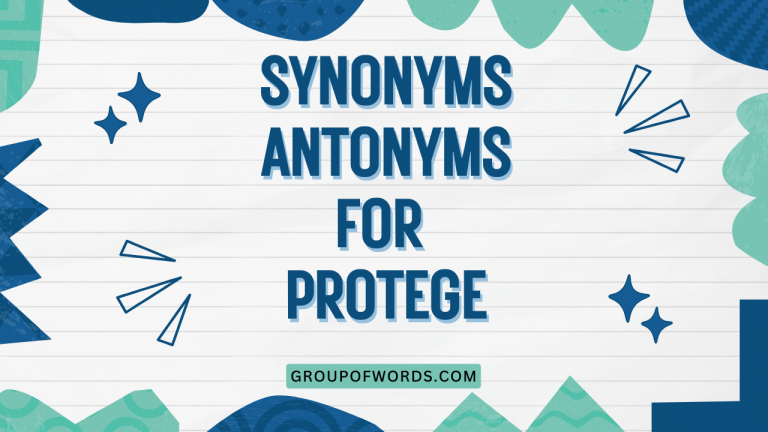Synonyms and Antonyms for Glass: A Comprehensive Guide
Understanding synonyms and antonyms is crucial for expanding your vocabulary and enhancing your communication skills. This article delves into the synonyms and antonyms of the word “glass,” exploring its various meanings and contexts.
This guide is beneficial for English language learners, writers, and anyone looking to enrich their linguistic repertoire. By examining the nuances of “glass” and its related terms, you’ll gain a deeper appreciation for the English language and improve your ability to express yourself with precision and clarity.
This comprehensive guide aims to provide a thorough understanding of the word “glass,” its diverse meanings, and its associated synonyms and antonyms. Whether you’re a student, a writer, or simply someone interested in expanding your vocabulary, this article will equip you with the knowledge and tools to use “glass” and its related terms effectively.
Table of Contents
- Introduction
- Definition of Glass
- Structural Breakdown of Glass-Related Terms
- Types and Categories of Glass Synonyms and Antonyms
- Examples of Synonyms and Antonyms in Sentences
- Usage Rules for Synonyms and Antonyms of Glass
- Common Mistakes When Using Synonyms and Antonyms of Glass
- Practice Exercises
- Advanced Topics: Figurative Language and Idioms
- Frequently Asked Questions (FAQ)
- Conclusion
Definition of Glass
The word “glass” has multiple meanings, which affects its synonyms and antonyms. Primarily, it refers to a hard, brittle, transparent or translucent substance, typically made by fusing sand with soda and lime and cooling it rapidly.
Additionally, “glass” can refer to a container made of glass, such as a drinking glass. It can also describe a looking glass or mirror.
Understanding these different contexts is crucial for selecting the appropriate synonym or antonym.
Glass, as a material, is an amorphous solid, meaning it lacks a long-range order characteristic of crystals. This property contributes to its transparency and brittleness.
The term “glass” can also refer to items made from this material, such as windows, bottles, and lenses. In the context of containers, “glass” often signifies a vessel used for drinking.
Finally, “glass” can denote a reflective surface, like a mirror, used for seeing one’s reflection.
Structural Breakdown of Glass-Related Terms
When considering synonyms and antonyms for “glass,” it’s important to understand the structure of the word and its related terms. The root word “glass” can be modified by prefixes and suffixes to create new words with different meanings.
For example, “glassware” refers to items made of glass, while “glazed” describes something covered with glass or a glass-like substance. Understanding these structural elements can aid in identifying appropriate synonyms and antonyms.
Furthermore, the context in which “glass” is used significantly impacts the choice of synonyms and antonyms. For instance, if “glass” is used to describe a window, synonyms like “pane” or “windowpane” might be suitable.
However, if “glass” refers to a drinking vessel, synonyms like “tumbler” or “goblet” would be more appropriate. Similarly, antonyms will vary depending on the specific meaning of “glass” in a given context.
Types and Categories of Glass Synonyms and Antonyms
Synonyms for Glass as a Material
When “glass” refers to the material itself, synonyms often relate to its composition, properties, or uses. These synonyms may not always be interchangeable, so it’s important to consider the specific context.
Examples include materials with similar transparency or brittleness.
Here’s a table illustrating synonyms for “glass” when it refers to the material:
| Synonym | Context/Nuance | Example Sentence |
|---|---|---|
| Silica | Refers to the primary component of many types of glass. | The beach was composed mostly of silica, the main ingredient in glass. |
| Crystal | Implies a high-quality, clear glass, often used for decorative items. | The chandelier was made of sparkling crystal. |
| Plexiglas | A brand name for acrylic glass, a transparent plastic alternative. | The hockey rink used Plexiglas to protect the spectators. |
| Acrylic | A type of transparent plastic that can be used as a substitute for glass. | The artist used acrylic sheets for his display case. |
| Pane | Often refers to a sheet of glass in a window or door. | The storm shattered the pane of the window. |
| Sheet Glass | Describes glass manufactured in flat sheets. | Sheet glass is commonly used for windows and doors. |
| Plate Glass | A thicker, higher-quality type of sheet glass. | The storefront used thick plate glass for security. |
| Tempered Glass | Glass that has been heat-treated to make it stronger. | Tempered glass is used in car windows for safety. |
| Safety Glass | A general term for glass designed to reduce injury when broken. | Safety glass is required in many building codes. |
| Laminated Glass | Glass made of two or more layers of glass with a plastic interlayer. | Laminated glass is used in windshields to prevent shattering. |
| Fiberglass | A material made of glass fibers embedded in a resin. | The boat hull was constructed from durable fiberglass. |
| Fused Quartz | A very pure type of glass with high heat resistance. | Fused quartz is used in high-temperature laboratory equipment. |
| Borosilicate Glass | A type of glass resistant to thermal shock, often used in labware. | Pyrex is a brand of borosilicate glass. |
| Optical Glass | High-quality glass used for lenses and other optical components. | The telescope lenses were made from precision optical glass. |
| Crown Glass | An early type of window glass made by blowing and spinning. | The antique window featured imperfections typical of crown glass. |
| Flint Glass | A heavy, brilliant glass made with lead oxide. | The antique vase was made of shimmering flint glass. |
| Soda-Lime Glass | The most common type of glass, used for bottles and windows. | Most bottles are made of inexpensive soda-lime glass. |
| Lead Glass | Glass containing lead oxide, giving it a high refractive index. | The crystal goblet was made of fine lead glass. |
| E-Glass | A type of fiberglass with a low alkali content, used in composites. | E-glass is commonly used to reinforce plastics. |
| D-Glass | A type of fiberglass with high dielectric strength. | D-glass is used in electrical applications. |
| S-Glass | A high-strength type of fiberglass. | S-glass is used in aerospace applications due to its strength. |
| A-Glass | A type of fiberglass with a high alkali content. | A-glass is often used for general-purpose applications. |
| C-Glass | A type of fiberglass with good chemical resistance. | C-glass is used in corrosive environments. |
| R-Glass | A high-performance type of fiberglass. | R-glass is used in demanding structural applications. |
Synonyms for Glass as a Container
When “glass” refers to a container, synonyms often relate to the type of vessel or its function. These synonyms provide more specific descriptions of the container’s purpose or shape.
Consider the context to choose the most accurate synonym.
Here’s a table illustrating synonyms for “glass” when it refers to a container:
| Synonym | Context/Nuance | Example Sentence |
|---|---|---|
| Tumbler | A simple drinking glass, usually without a stem. | He poured himself a tumbler of water. |
| Goblet | A stemmed drinking glass, often used for wine or special occasions. | She raised her goblet in a toast. |
| Cup | A small, handled container for hot drinks. | He drank his coffee from a ceramic cup. |
| Beaker | A lipped cylindrical glass container for laboratory use. | The scientist poured the solution into a beaker. |
| Jar | A wide-mouthed glass container, often used for storage. | She stored the homemade jam in a jar. |
| Vessel | A general term for a container. | The ancient vessel was made of clay. |
| Carafe | A glass container for serving water or wine. | The waiter brought a carafe of water to the table. |
| Flute | A tall, narrow glass used for champagne. | They toasted with champagne in elegant flutes. |
| Mug | A large, sturdy glass or ceramic cup, often for beer or coffee. | He enjoyed a large mug of beer at the pub. |
| Pint Glass | A glass specifically designed to hold a pint of beer. | He ordered a pint glass of ale. |
| Shot Glass | A small glass for measuring and serving liquor. | The bartender filled a shot glass with tequila. |
| Highball Glass | A tall glass used for mixed drinks. | She ordered a gin and tonic in a highball glass. |
| Collins Glass | Similar to a highball glass, but slightly taller. | The cocktail was served in a Collins glass. |
| Mason Jar | A glass jar with a screw-on lid, often used for canning. | She used a Mason jar to store her pickles. |
| Decanter | A glass container used to hold and serve wine. | He poured the wine into a crystal decanter. |
| Laboratory Flask | A specialized glass container used in scientific experiments. | The chemist heated the solution in a laboratory flask. |
| Erlenmeyer Flask | A conical flask with a flat bottom, used in laboratories. | The titration was performed in an Erlenmeyer flask. |
| Volumetric Flask | A flask calibrated to contain a precise volume at a specific temperature. | The standard solution was prepared in a volumetric flask. |
| Test Tube | A small glass tube used in laboratories for holding and mixing substances. | The sample was collected in a test tube. |
| Petri Dish | A shallow cylindrical glass or plastic dish used for culturing microorganisms. | The bacteria were cultured in a Petri dish. |
| Pipette | A slender tube used for measuring and transferring small quantities of liquid. | The technician used a pipette to add the reagent. |
| Burette | A graduated glass tube with a tap at one end, used for delivering known volumes of a liquid. | The acid was dispensed from a burette. |
| Crucible | A container used for melting or subjecting materials to very high temperatures. | The metal was melted in a crucible. |
| Retort | A glass container with a long, bent neck, used for distillation. | The alchemist used a retort for his experiments. |
Synonyms for Glass as a Mirror
When “glass” is used to refer to a mirror, the synonyms relate to reflective surfaces or looking glasses. These synonyms often emphasize the reflective quality or the purpose of the object.
Here’s a table with synonyms for “glass” when referring to a mirror:
| Synonym | Context/Nuance | Example Sentence |
|---|---|---|
| Mirror | A reflective surface, typically made of glass with a metallic backing. | She checked her reflection in the mirror. |
| Looking Glass | An older term for a mirror. | The queen gazed into the looking glass. |
| Reflector | A surface designed to reflect light or other radiation. | The telescope used a large reflector to gather light. |
| Polished Surface | Any surface that has been smoothed and shined to create a reflective quality. | The polished surface of the metal reflected the light. |
| Reflecting Pool | A pool of water designed to create a mirror-like reflection. | The monument was reflected in the calm reflecting pool. |
| Speculum | A metal mirror, especially one used by surgeons or dentists. | The dentist used a speculum to examine the patient’s mouth. |
| Rearview Mirror | A mirror in a vehicle that allows the driver to see behind. | He checked the rearview mirror before changing lanes. |
| Vanity Mirror | A mirror used for applying makeup or grooming. | She sat at her vanity and looked into the vanity mirror. |
| Concave Mirror | A mirror with a surface that curves inward. | The shaving concave mirror magnified his face. |
| Convex Mirror | A mirror with a surface that curves outward. | The security guard monitored the store with a convex mirror. |
| Two-Way Mirror | A mirror that appears reflective on one side but transparent on the other. | The detectives observed the suspect through a two-way mirror. |
| Prism | An optical element that reflects light. | The light was split into a spectrum by the prism. |
| Lens | A piece of glass or other transparent substance with curved sides for concentrating or dispersing light rays. | The camera had a high-quality lens. |
| Window | Sometimes, a window can act as a mirror, reflecting the outside world. | The window reflected the trees outside. |
Antonyms for Glass as a Material
Antonyms for “glass” as a material often describe substances that are opaque, flexible, or durable, contrasting with glass’s transparency and brittleness. These can include materials like wood, metal, or rubber.
Here’s a table with antonyms for “glass” when referring to the material:
| Antonym | Context/Nuance | Example Sentence |
|---|---|---|
| Metal | An opaque, strong, and often ductile material. | The door was made of solid metal. |
| Wood | An opaque, organic material that is strong but not transparent. | The table was crafted from dark wood. |
| Stone | A hard, opaque material formed of mineral matter. | The castle was built from heavy stone. |
| Rubber | A flexible, elastic material. | The tires were made of durable rubber. |
| Fabric | A cloth material that is opaque and flexible. | The curtains were made of thick fabric. |
| Opaque Plastic | A non-transparent plastic material. | The container was made of opaque plastic to protect the contents from light. |
| Concrete | A heavy, opaque building material. | The foundation was poured with strong concrete. |
| Clay | A malleable, opaque material that hardens when fired. | The pottery was made from natural clay. |
| Cardboard | A thick, stiff paper material that is opaque. | The package was reinforced with cardboard. |
| Leather | A strong, flexible material made from animal hide. | The jacket was made of supple leather. |
| Ceramic | A hard, brittle, heat-resistant and corrosion-resistant material made by firing clay. | The tiles were made of glazed ceramic. |
| Brick | A rectangular block of baked clay used for building. | The house was constructed with red brick. |
| Resin | A solid or highly viscous substance, often opaque. | The statue was molded from resin. |
Antonyms for Glass as a Container
Antonyms for “glass” when it means a container often refer to containers made of different materials, such as plastic, metal, or paper, or containers designed for different purposes.
Here’s a table with antonyms for “glass” when referring to a container:
| Antonym | Context/Nuance | Example Sentence |
|---|---|---|
| Plastic Cup | A disposable or reusable cup made of plastic. | He drank his soda from a plastic cup. |
| Paper Cup | A disposable cup made of paper. | She grabbed a paper cup for her coffee. |
| Metal Can | A container made of metal, often used for beverages or food. | He opened a metal can of soda. |
| Thermos | An insulated container that keeps liquids hot or cold. | He poured hot coffee from his thermos. |
| Canteen | A container for carrying water, often used by soldiers or hikers. | The hiker filled his canteen with fresh water. |
| Leather Flask | A container made of leather, often used for carrying liquids (historically). | He carried wine in a leather flask. |
| Wooden Barrel | A large container made of wood, often used for storing liquids like wine or beer. | The whiskey was aged in a wooden barrel. |
| Clay Pot | A container made of baked clay. | She cooked the stew in a clay pot. |
| Carton | A container made of cardboard or paperboard. | He bought a carton of milk. |
| Box | A container typically made of cardboard or wood, used for storage or transport. | The books were packed in a box. |
| Pouch | A small bag or sack. | He carried the coins in a pouch. |
| Sack | A large bag, typically made of burlap or strong paper. | The potatoes were stored in a sack. |
| Amphora | A tall ancient Greek or Roman jar with two handles and a narrow neck. | The olive oil was stored in an amphora. |
Examples of Synonyms and Antonyms in Sentences
Understanding the context is key to using synonyms and antonyms effectively. The following examples demonstrate how to use the synonyms and antonyms of “glass” in various sentences, highlighting their specific nuances.
Examples for Glass as a Material
Here are examples of sentences using synonyms and antonyms for “glass” when it refers to the material:
| Original Sentence | Synonym Sentence | Antonym Sentence |
|---|---|---|
| The window was made of glass. | The window was made of a pane. | The door was made of solid wood. |
| The sculpture was crafted from delicate glass. | The sculpture was crafted from delicate crystal. | The statue was molded from durable metal. |
| The protective shield was made of glass. | The protective shield was made of Plexiglas. | The protective shield was made of strong steel. |
| The car windows are made of glass. | The car windows are made of tempered glass. | The car body is made of metal. |
| The boat is made of glass. | The boat is made of fiberglass. | The boat is made of wood. |
Examples for Glass as a Container
Here are examples of sentences using synonyms and antonyms for “glass” when it refers to a container:
| Original Sentence | Synonym Sentence | Antonym Sentence |
|---|---|---|
| He drank water from the glass. | He drank water from the tumbler. | He drank water from the plastic cup. |
| She raised her glass in a toast. | She raised her goblet in a toast. | She raised her paper cup in a toast. |
| The scientist poured the liquid into the glass. | The scientist poured the liquid into the beaker. | The scientist stored the liquid in a metal container. |
| He ordered a glass of beer. | He ordered a pint glass of beer. | He ordered a beer in a metal can. |
| She stored the jam in a glass. | She stored the jam in a jar. | She stored the jam in a plastic container. |
Examples for Glass as a Mirror
Here are examples of sentences using synonyms for “glass” when it refers to a mirror:
| Original Sentence | Synonym Sentence |
|---|---|
| She looked at her reflection in the glass. | She looked at her reflection in the mirror. |
| The queen gazed into the glass. | The queen gazed into the looking glass. |
| The telescope used a glass to gather light. | The telescope used a reflector to gather light. |
| The light was reflected off the glass. | The light was reflected off the polished surface. |
| He checked the rearview glass before changing lanes. | He checked the rearview mirror before changing lanes. |
Usage Rules for Synonyms and Antonyms of Glass
The usage of synonyms and antonyms for “glass” is governed by context. When referring to the material, use synonyms like “silica,” “crystal,” or “pane” depending on the specific type or application of the glass.
When referring to a container, use synonyms like “tumbler,” “goblet,” or “jar” based on the container’s shape and purpose. When referring to a mirror, use synonyms like “mirror” or “looking glass.” Antonyms should be chosen to represent contrasting materials or container types.
It’s important to note that some synonyms and antonyms may have specific connotations or be more appropriate in certain registers (formal vs. informal). For example, “goblet” is more formal than “glass” when referring to a drinking vessel.
Similarly, “metal” is a general antonym for “glass” as a material, but “rubber” might be more appropriate if emphasizing flexibility.
Common Mistakes When Using Synonyms and Antonyms of Glass
One common mistake is using synonyms interchangeably without considering the specific context. For example, using “crystal” when referring to a window pane is incorrect because “crystal” implies high-quality, decorative glass.
Another mistake is choosing antonyms that don’t directly contrast with the intended meaning of “glass.” For instance, using “soft” as an antonym for “glass” is too broad; a more accurate antonym would be “flexible” or “opaque,” depending on the context.
Another frequent error is using synonyms that are too general or too specific. For instance, using “container” as a synonym for “glass” is too broad because it doesn’t capture the specific material.
Conversely, using a very specific term like “Erlenmeyer flask” when simply referring to a drinking glass is inappropriate. Always consider the audience and the level of detail required when choosing synonyms and antonyms.
Here are some examples of common mistakes and their corrections:
| Incorrect Sentence | Correct Sentence | Explanation |
|---|---|---|
| He looked through the crystal in the window. | He looked through the pane in the window. | “Crystal” implies decorative glass, while “pane” refers to a sheet of window glass. |
| She drank from a plastic. | She drank from a plastic cup. | “Plastic” is too general; “plastic cup” specifies the container type. |
| The opposite of glass is soft. | The opposite of glass is metal. | “Soft” is not a direct antonym; “metal” contrasts with glass’s properties. |
| He stored the liquid in a vessel. | He stored the liquid in a jar. | “Vessel” is too general; “jar” is more specific and appropriate. |
| The light reflected off the wall. | The light reflected off the mirror. | “Wall” is not a synonym for glass as a mirror; “mirror” is the correct term. |
Practice Exercises
Test your understanding of synonyms and antonyms for “glass” with these practice exercises. Choose the best synonym or antonym for “glass” in each sentence, based on the context.
| Question | Answer Choices | Correct Answer |
|---|---|---|
| 1. The shattered ______ from the window was dangerous. | (a) metal (b) pane (c) wood (d) fabric | (b) pane |
| 2. She poured wine into the elegant ______. | (a) can (b) goblet (c) plastic cup (d) sack | (b) goblet |
| 3. He checked his reflection in the ______. | (a) carton (b) stone (c) mirror (d) beaker | (c) mirror |
| 4. The table was not made of glass, but of solid ______. | (a) crystal (b) tumbler (c) wood (d) silica | (c) wood |
| 5. She stored the homemade pickles in a ______. | (a) flute (b) jar (c) thermos (d) clay pot | (b) jar |
| 6. The protective shield for the machine was made of ______. | (a) cardboard (b) plexiglas (c) brick (d) clay | (b) plexiglas |
| 7. The laboratory experiment required a ______. | (a) mirror (b) beaker (c) leather flask (d) concrete | (b) beaker |
| 8. The car’s windshield is made of ______ for safety. | (a) crown glass (b) laminated glass (c) flint glass (d) soda-lime glass | (b) laminated glass |
| 9. He preferred to drink his beer from a ______. | (a) highball glass (b) pint glass (c) collins glass (d) shot glass | (b) pint glass |
| 10. Instead of a glass window, the shed had a ______ covering. | (a) optical glass (b) fused quartz (c) plastic (d) borosilicate glass | (c) plastic |
Advanced Topics: Figurative Language and Idioms
The word “glass” appears in various idioms and figurative expressions, adding another layer of complexity to its usage. For example, the phrase “a glass half full” refers to an optimistic outlook, while “a glass half empty” represents a pessimistic one.
Similarly, “people who live in glass houses shouldn’t throw stones” means that those who are vulnerable to criticism should not criticize others.
Understanding these idiomatic expressions is crucial for advanced learners. The literal meaning of “glass” is often irrelevant in these contexts; instead, the phrase conveys a symbolic or metaphorical meaning.
Recognizing and interpreting these expressions can significantly enhance your comprehension and fluency in English.
Here are some examples of idioms using “glass”:
- Through a glass darkly: In an obscure or unclear way. Example: We can only see the future through a glass darkly.
- A glass ceiling: An invisible barrier that prevents someone, especially a woman, from rising beyond a certain level in a hierarchy. Example: Despite her qualifications, she faced a glass ceiling in her career.
- Take the glass: To drink
a drink. Example: He took the glass in one gulp.
- A glass eye: An artificial eye made of glass or plastic. Example: The pirate had a glass eye.
Exploring these idioms provides a deeper understanding of how “glass” is used beyond its literal definitions. Recognizing these expressions can improve both comprehension and communication skills.
Frequently Asked Questions (FAQ)
This section addresses common questions related to the synonyms and antonyms of “glass,” providing further clarification and practical guidance.
What is the best synonym for “glass” when referring to a window?
The best synonym for “glass” when referring to a window is “pane.” This term specifically denotes a sheet of glass used in a window or door, providing a more precise description.
How do I choose the right antonym for “glass”?
Choosing the right antonym depends on the context. If “glass” refers to the material, consider antonyms like “metal,” “wood,” or “stone,” which highlight the differences in opacity and durability.
If “glass” refers to a container, consider antonyms like “plastic cup” or “metal can,” which emphasize the difference in material and disposability.
Is “crystal” always a good synonym for “glass”?
No, “crystal” is not always a suitable synonym for “glass.” “Crystal” implies a high-quality, clear glass often used for decorative items like chandeliers or fine tableware. It is not appropriate for describing ordinary window glass or containers.
Can “mirror” and “looking glass” be used interchangeably?
Yes, “mirror” and “looking glass” can generally be used interchangeably. However, “looking glass” is an older term and may sound more formal or archaic in modern usage.
What are some common mistakes to avoid when using synonyms for “glass”?
Avoid using synonyms that are too general or too specific for the context. For example, using “container” as a synonym for a drinking glass is too broad, while using “Erlenmeyer flask” is too specific.
Also, be mindful of connotations; “crystal” implies higher quality than “glass.”
How can understanding idioms help me use “glass” more effectively?
Understanding idioms involving “glass” enhances your comprehension of figurative language and idiomatic expressions. This knowledge enables you to interpret nuanced meanings and communicate more effectively in English.
Conclusion
Mastering the synonyms and antonyms of “glass” requires a nuanced understanding of its various meanings and contexts. By considering the specific application—whether as a material, a container, or a reflective surface—you can choose the most appropriate and effective words to enhance your communication.
This comprehensive guide has provided you with the tools and knowledge to navigate the complexities of “glass” and its related terms, empowering you to express yourself with greater precision and clarity.
Continue to practice and expand your vocabulary, and you’ll find that your ability to use synonyms and antonyms for “glass” and other words will significantly improve, enriching your linguistic skills and overall command of the English language. Remember to always consider the context and audience when selecting the most suitable words for your writing and speaking.





